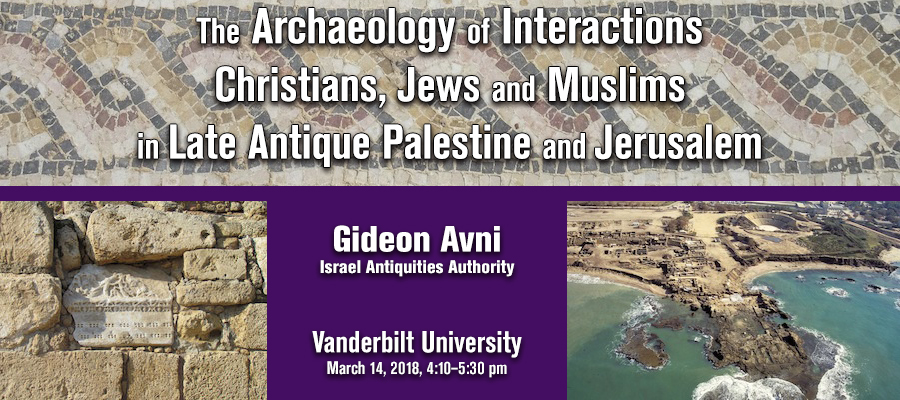The Archaeology of Interactions: Christians, Jews and Muslims in Late Antique Palestine and Jerusalem, lecture by Gideon Avni (Israel Antiquities Authority), Vanderbilt University, March 14, 2018, 4:10–5:30 pm
The seventh century CE witnessed one of the most dramatic changes in global history: the collapse of the Byzantine and Sassanian Empires and the rise of a new political and religious entity, the Arab Muslim Caliphate. This event marks also a significant milestone in the life of Jewish and Christian communities in the Near East.
In the light of this constitutive event, Avni's lecture will address the interaction between Jewish, Christian and Muslim communities, based on a plethora of recent archaeological discoveries related to Byzantine and Early Islamic Palestine. Particularly significant is the evidence of renewal and expansion of Jewish communities under Muslim rule, including the re-establishment of Jewish presence in Jerusalem after 500 years of Pagan and Christian rule on the city, and the continuity of Christian communities under Islamic rule. This interaction is well reflected in cities and their hinterlands throughout the country, among them Tiberias, Gerasa - Jarash, and Caesarea Maritima.
The recent archaeological findings highlight some longue durée aspects in the religious interactions and change between Jewish and Christian communities, and address some methodological issues concerning the identification of religious change through archaeological material.
Gideon Avni is the Head of the Archaeological Division in the Israel Antiquities Authority and a lecturer at the Institute of Archaeology at the Hebrew University, Jerusalem. His academic interests focus on various aspects of Classical, Late Antique and Early Islamic archaeology, the cultural and religious transformation of the Near East from Byzantine to Islamic rule, and the archaeology of desert societies in the Levant. He has conducted extensive fieldwork in the Negev Desert, Beth Guvrin, Jerusalem, and Ramla.
